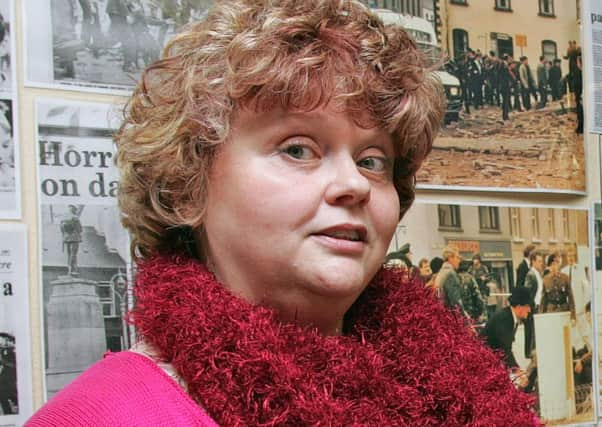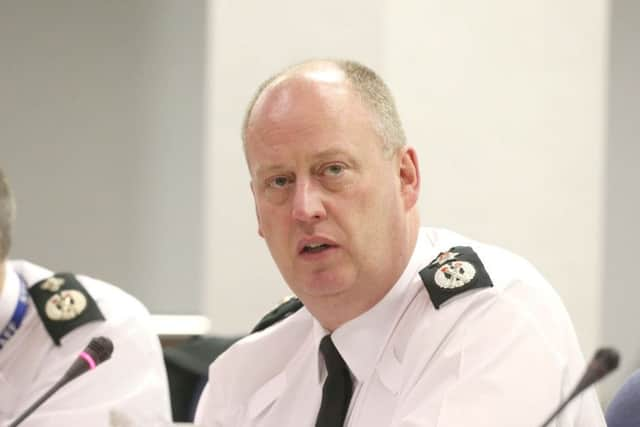Enniskillen relative: chief constable reduced me to tears


Aileen Quinton has spoken out after George Hamilton stated that he would support the idea of a discussion about when to “draw the line” under the Province’s troubled past.
The chief constable has previously warned about the pressures which policing past crimes are placing on the present-day PSNI.
Advertisement
Hide AdAdvertisement
Hide AdMs Quinton, whose mother was killed in the Enniskillen bombing in 1987, said she had been reduced to tears by his remark, which he made in a BBC news report, broadcast on Thursday.


She responded with a hard-hitting statement in which she said that the PSNI’s leader’s job is simply to chase down criminals, “not to call for any debates about letting murders be written off”.
Ms Quinton said: “The chief constable’s words had me in tears yesterday morning.
Betrayal from someone in his position strikes deep. It is not ‘just’ the betrayal re my mother and the notion of writing off her murder.
Advertisement
Hide AdAdvertisement
Hide Ad“It is a betrayal of a lot of what she and my father stood for.


“My father joined the RUC Reserve at 65 and didn’t retire from it until 70. He wanted to do his bit in protecting us all and respond in a legitimate manner to the terrorist threat posed.”
Willie Frazer, who has been bereaved repeatedly by IRA violence, said he was disappointed by the remark, “given the fact he knows the price that was paid in blood and suffering to uphold justice”.
Mr Frazer said the Mr Hamilton appeared to be trying promote a discussion of an Troubles-era amnesty
Advertisement
Hide AdAdvertisement
Hide AdThe Attorney-General John Larkin had faced a hostile reaction from many victims in 2013 when he mooted the idea of an end to such prosecutions.
The chief constable’s comment formed part of a roughly two-and-a-half minute BBC report, broadcast on Thursday’s national 6pm bulletin.
In the clip, which focuses on Troubles-era violence and is available on the BBC Northern Ireland website, he was asked: “Is there a time when you do have to draw the line and have to say, for the good of future generations: Enough is enough, we have to move on?”
He replied: “I think that’s largely a political question. I think that’s a debate worth having.”
Advertisement
Hide AdAdvertisement
Hide AdWillie Frazer (whose father, two cousins and two uncles were killed by the IRA), said: “Nobody has the right to ask the families who lost their loved ones to give up on any hope they ever had of receiving justice.
“Most of us know we will probably never get it, but we will not betray our dead and allow terrorists to rewrite our history.
“Once you take justice out of the equation then everybody is responsible for what took place in Northern Ireland as nobody is accountable.”
He said that “an amnesty will never be acceptable to the majority of innocent victims”.
Advertisement
Hide AdAdvertisement
Hide AdThese criticisms were put to the PSNI, and its press office was asked whether a Troubles amnesty was in fact what George Hamilton had in mind.
It responded by sending a more substantial set of interview remarks the chief constable had made on the subject of “drawing a line” under the past.
It quoted Mr Hamilton as saying: “The Attorney General, maybe three years ago, put that on the table and there was a negative political response to the suggestion.
“I think it is a debate worth having but I am not advocating one way or the other.
Advertisement
Hide AdAdvertisement
Hide Ad“Fundamentally, how we deal with the past in that sense is for the politicians. My responsibility is to fulfil the statutory obligations I have.
“Section 32 of the Police Act is very clear – to investigate crime, to gather evidence and bring offenders to justice and that is what we are going to do with integrity and honesty.”